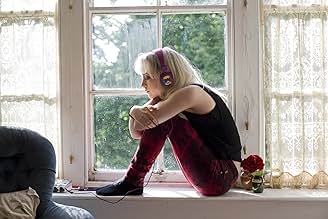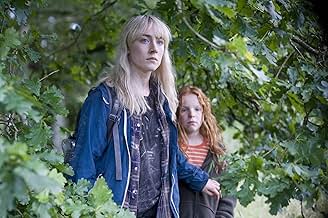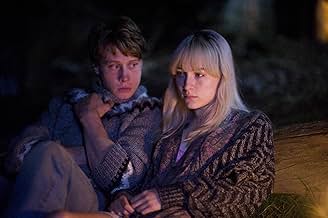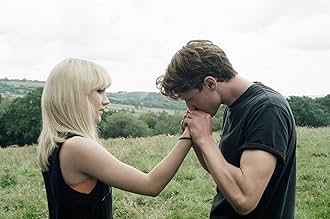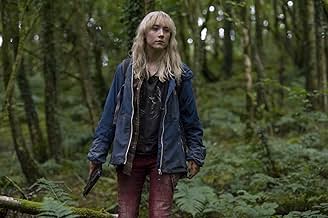VALUTAZIONE IMDb
6,4/10
32.818
LA TUA VALUTAZIONE
Una ragazza americana viene inviata nella campagna inglese per stare con i parenti e trova l'amore quando combatte per la sua sopravvivenza mentre la guerra avvolge il suo mondo.Una ragazza americana viene inviata nella campagna inglese per stare con i parenti e trova l'amore quando combatte per la sua sopravvivenza mentre la guerra avvolge il suo mondo.Una ragazza americana viene inviata nella campagna inglese per stare con i parenti e trova l'amore quando combatte per la sua sopravvivenza mentre la guerra avvolge il suo mondo.
- Regia
- Sceneggiatura
- Star
- Premi
- 1 vittoria e 8 candidature totali
Tony Arvanitis
- Soldier
- (non citato nei titoli originali)
Recensioni in evidenza
Daisy (Saoirse Ronan) is a young, broody, moody, American girl who is sent to stay with extended family in the English countryside. At first cynical about her summer arrangements and outwardly cold towards her jolly hosts, slowly she begins to thaw to their hospitable nature and thus begins to discover something within herself in this new setting – a home away from home. But just as she finds her place in the world, an unthinkable event occurs and everything is thrown into turmoil. In a World War III type scenario, she is taken away from those she now considers family in the first and with only the companionship of her young cousin Piper (Harley Bird), she must journey back across the warn torn English countryside, to the place she wants to call Home.
It's a curious pick n' mix type story that in some ways feels like two genres melded together. The immediate narrative feels very much like a teen 'chick flick', but this is played out over a dark backdrop that at times feels course and close to the bone.
To me, the running commentary of Daisy the American girl, outlining her disciplined set of rules and paranoia, felt a little cheesy in its attempt to force home the difference between English and American culture. So too do some of the romanticised elements of country living, such as the young fourteen year old cousin (Tom Holland) who drives without a license, or the dashing older cousin (George MacKay) who raises eagles and will suck the dirt out of a bloody cut. It's a pity because I felt some of the subtler signifiers, such as the character of the motherly aunt (Anna Chancellor), or indeed the setting of the old country home with it's beautiful but cluttered wood interior and the backdrop of rolling English countryside, spoke a thousand words that other forced elements could only ever hope to convey. In this way I felt the scenario in itself, a city girl living in the countryside, should have been self explanatory.
If you can manage to overlook some of the hammier elements of the narrative, the movie really gets interesting in the build up, and realisation, to war. Movies about atrocities of war generally maintain a degree of separation for the Western World viewer because of differences in geographical location, time or culture. Whereas, where zombie movies may deal with scenarios in a world as we know it, again we feel separated by the fantastical suspension of disbelief that has to be made in order to accept a universe where zombies can walk the Earth. How I Live Now is set in a time, a world, a space that is starkly familiar to our own and so the degree of separation --that this could really happen to us!-- is only a small leap of faith. Indeed, the detached manner of the news reporters add a level of verisimilitude as they sound very much like reports we might see on our own t.v. screens on any given day. And so the rate and horror at which we see State structures deteriorate after the bomb is dropped, can be felt vicariously.
By actually detaching itself from the politics, How I Live Now manages to depict a faceless horror to war that is far more disturbing than if we had all the answers at the ready. We are never quite certain, for example, what spurred the bomb in the first place: if it was an invasion from abroad or a movement from within. Are the government forces that split Daisy from her male cousins simply making poor decisions on her behalf? We are left wondering who the real enemy is, but that doesn't really matter anyway, as soon we learn that even in a war of 'sides', those caught in the middle can only become victims. The pile of bodies that Daisy shifts through is a scene that echoes real life atrocities and dumps the reality at our door. The story is powerful in this way, because even though it speaks through a 'pop' veneer, still it touches upon the human condition. Our heroine cannot hope to change outcomes outright, but rather, in a grim reality, try only to traverse a topsy-turvy environment haphazardly.
So overall, does the movie work? Perhaps not entirely for the reasons I stated above. The over romanticised elements may prove too much for some. Again, we have some Lassie Come Home moments in the later half of the movie which bordered on cheese for me. And yet I can't help but feel drawn to this flick – I have to give it kudos for its attempt to nit 'realism' and romanticism together. It's a quirky number with genuine flavour and thus, despite my criticism, manages to stick out in the mind while other more generic movies fade away from memory.
It's a curious pick n' mix type story that in some ways feels like two genres melded together. The immediate narrative feels very much like a teen 'chick flick', but this is played out over a dark backdrop that at times feels course and close to the bone.
To me, the running commentary of Daisy the American girl, outlining her disciplined set of rules and paranoia, felt a little cheesy in its attempt to force home the difference between English and American culture. So too do some of the romanticised elements of country living, such as the young fourteen year old cousin (Tom Holland) who drives without a license, or the dashing older cousin (George MacKay) who raises eagles and will suck the dirt out of a bloody cut. It's a pity because I felt some of the subtler signifiers, such as the character of the motherly aunt (Anna Chancellor), or indeed the setting of the old country home with it's beautiful but cluttered wood interior and the backdrop of rolling English countryside, spoke a thousand words that other forced elements could only ever hope to convey. In this way I felt the scenario in itself, a city girl living in the countryside, should have been self explanatory.
If you can manage to overlook some of the hammier elements of the narrative, the movie really gets interesting in the build up, and realisation, to war. Movies about atrocities of war generally maintain a degree of separation for the Western World viewer because of differences in geographical location, time or culture. Whereas, where zombie movies may deal with scenarios in a world as we know it, again we feel separated by the fantastical suspension of disbelief that has to be made in order to accept a universe where zombies can walk the Earth. How I Live Now is set in a time, a world, a space that is starkly familiar to our own and so the degree of separation --that this could really happen to us!-- is only a small leap of faith. Indeed, the detached manner of the news reporters add a level of verisimilitude as they sound very much like reports we might see on our own t.v. screens on any given day. And so the rate and horror at which we see State structures deteriorate after the bomb is dropped, can be felt vicariously.
By actually detaching itself from the politics, How I Live Now manages to depict a faceless horror to war that is far more disturbing than if we had all the answers at the ready. We are never quite certain, for example, what spurred the bomb in the first place: if it was an invasion from abroad or a movement from within. Are the government forces that split Daisy from her male cousins simply making poor decisions on her behalf? We are left wondering who the real enemy is, but that doesn't really matter anyway, as soon we learn that even in a war of 'sides', those caught in the middle can only become victims. The pile of bodies that Daisy shifts through is a scene that echoes real life atrocities and dumps the reality at our door. The story is powerful in this way, because even though it speaks through a 'pop' veneer, still it touches upon the human condition. Our heroine cannot hope to change outcomes outright, but rather, in a grim reality, try only to traverse a topsy-turvy environment haphazardly.
So overall, does the movie work? Perhaps not entirely for the reasons I stated above. The over romanticised elements may prove too much for some. Again, we have some Lassie Come Home moments in the later half of the movie which bordered on cheese for me. And yet I can't help but feel drawn to this flick – I have to give it kudos for its attempt to nit 'realism' and romanticism together. It's a quirky number with genuine flavour and thus, despite my criticism, manages to stick out in the mind while other more generic movies fade away from memory.
There is some extraordinary sensitivity in Saoirse Ronan that made me watch the trailer that eventually led me to the movie. It is beautifully shot drama. Its dynamics created by the sequence of light and darkness, nature and civilization is so captivating that you are up in it right till the end.The portrayal of a nuclear war is not too light so it is believable, but not too dark so it leaves you hope. The film deals with the great theme of significant vs petty in life which makes you once again to think about what you really care about in this raw nerved life. There is some reaffirming conclusions about the one's will power that can do much greater deal that helping restrain the desire for chocolate,which could've been brought a bit further. But overall it is an interesting movie that asks the right questions, the only right answers being within each and everyone of us.
This film starts out on a slow burn, but is not about car chases, explosions or blood and gore. With that out the way, what it is, is warmly filmed and deftly directed. I found it a very enjoyable exploration of the aftermath of a civil war, and the impact that has on several young lives. Some reviewers have commented that setting that civil war in the UK is not realistic. But that is to wholly miss the point of this movie. It's a film about people under extreme adversity and random circumstance, the setting is peripheral. Its about they deal with the fast changing situation, and the changes that occur in them as a result. Well paced from at least a quarter of the way in the ending is emotional and moving. I'll leave it for you to judge if you agree with me. So long as your not looking for a happy movie, but something that digs a little deeper.... then I don't think you will be disappointed.
Didn't know quite what to expect from this but was quickly captivated by this film. Saoirse Ronan gives a superb performance and really holds the film together. Initially its a fish out of water story about Saoirse Ronan's character, a difficult but intriguing American teen landing into an eccentric English rural family who live on a remote farm. She quickly starts to fall for her handsome cousin but then world events intervene as a nuclear device is detonated in London and the film shows them dealing with the new reality of soldiers at the door, mass evacuation and the family being split up. The depiction of what UK would be like under martial law, with guerrilla attacks, forced labor camps and a society breaking down was both chilling and fascinating. Ultimately, it becomes a survival story as Saoirse Ronan's character tries to get back to the farm and she has to make her way through the nightmarish landscape of an England descending into chaos. With a great soundtrack and many poignant moments, this is a well crafted film on all fronts. Recommended.
HOW I LIVE NOW is a poignant, disturbing, enthralling, and horrific film. Wonderful soundtrack and natural imagery that contrasts beautifully with the ugly and treacherous human world. Allegorical qualities: We don't know many of the specifics of who the terrorists are, the backgrounds of many characters, their full names, exact locations in Britain, etc. In those and many other respects, HILN is more for the heart than the head.
Good performance by Saoirse Ronan as Daisy, a brash, cantankerous, and troubled American teenager who is sent to live with some distant relatives in the English countryside. Ditto for the others who play the various teenagers and children. However, the relationship between Daisy and Eddie develops a bit suddenly and unconvincingly; with everything else that is happening here, the character development suffers. I have not yet read Meg Rosoff's original novel, but I would guess that it is yet another book that can never be done justice on screen. Nevertheless, I found this film well worth watching, and it should prove especially useful as a basic illuminator for the book.
Good performance by Saoirse Ronan as Daisy, a brash, cantankerous, and troubled American teenager who is sent to live with some distant relatives in the English countryside. Ditto for the others who play the various teenagers and children. However, the relationship between Daisy and Eddie develops a bit suddenly and unconvincingly; with everything else that is happening here, the character development suffers. I have not yet read Meg Rosoff's original novel, but I would guess that it is yet another book that can never be done justice on screen. Nevertheless, I found this film well worth watching, and it should prove especially useful as a basic illuminator for the book.
Lo sapevi?
- QuizDirector Kevin Macdonald had originally intended the cast to be all unknown or amateur actors and actresses and was looking for an American girl, around sixteen years old, to play Daisy, but cast Irish 18-year-old Saoirse Ronan instead, after her audition, reading a scene which left them in tears.
- BlooperAt 28:37, Isaac leaps over the couch (holding a flashlight) and lands comfortably seated, a quick-action scene completed with two different camera angles. In the first, Eddie is watching Isaac's antics, while in the second, Eddie is instead looking down at his radio.
- ConnessioniFeatured in Projector: How I Live Now (2013)
- Colonne sonoreDo It With A Rockstar
Written by Amanda Palmer
Performed by Amanda Palmer and The Grand Theft Orchestra
I più visti
Accedi per valutare e creare un elenco di titoli salvati per ottenere consigli personalizzati
- How long is How I Live Now?Powered by Alexa
Dettagli
- Data di uscita
- Paesi di origine
- Siti ufficiali
- Lingua
- Celebre anche come
- Mi Vida Ahora
- Luoghi delle riprese
- Aziende produttrici
- Vedi altri crediti dell’azienda su IMDbPro
Botteghino
- Budget
- 8.000.000 USD (previsto)
- Lordo Stati Uniti e Canada
- 60.213 USD
- Fine settimana di apertura Stati Uniti e Canada
- 28.547 USD
- 10 nov 2013
- Lordo in tutto il mondo
- 925.762 USD
- Tempo di esecuzione1 ora 41 minuti
- Colore
- Mix di suoni
- Proporzioni
- 1.85 : 1
Contribuisci a questa pagina
Suggerisci una modifica o aggiungi i contenuti mancanti

Divario superiore
By what name was Come vivo ora (2013) officially released in India in Hindi?
Rispondi



